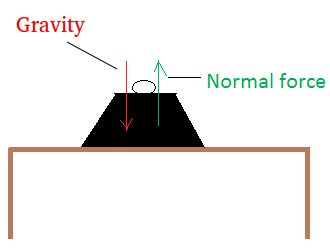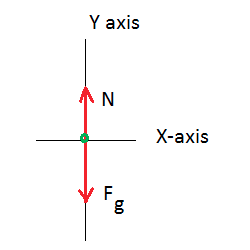Normal force
If you put a weight on a table, the weight will press down on the table.
The normal force is the force that pushes straight up on the
weight.
In the figure below, the green arrow is the force that pushes on the
weight. The red arrow is the force that pushes on the table.

Similarly, when you stand on the ground, it is not just you who can push down with some force on the ground. The ground is also pushing up with some force on you as well.
This type of force applies only to solid surfaces. It would not apply to a surface of a fluid. For instance, the force applied on the bottom of a boat or ship is not a normal force. It is called buoyant force.
The normal force is always perpendicular to the surface where the weight is applying some force. In fact, the word normal means perpendicular.
How to find the normal force
To find the normal force, just put all the forces on the y-axis. Notice that we
show nothing on the x-axis. The reason for this is because there is no
horizontal movement and no horizontal force. The diagram below shows the
forces on the y-axis.

We can apply Newton's second law of motion to find the normal force.
You can then write an equation that represents the situation in the diagram. First, let us talk about the acceleration. Since the weight and the table are not accelerating, the acceleration is equal to zero.
When writing the equation for the net force, always start by writing the forces that are positive. The forces are positive if they are oriented upward. Remember that in the coordinate system, up is positive.
we get: N - Fg = m × a ySince Fg = m × g, we can substitute m × g for Fg
we get: N - m × g = m × a y
Since ay = 0, m × a y = 0 and the equation becomes:
N - m × g = 0
Since m × g - m × g = 0,
N = m × g
A little exercise:
A man with a mass of 100 kg stands on a table. How big is the force exerted on the man?
Solution: The force exerted on the man is the normal force.
We showed above that this force is equal to the mass times the acceleration of gravity.